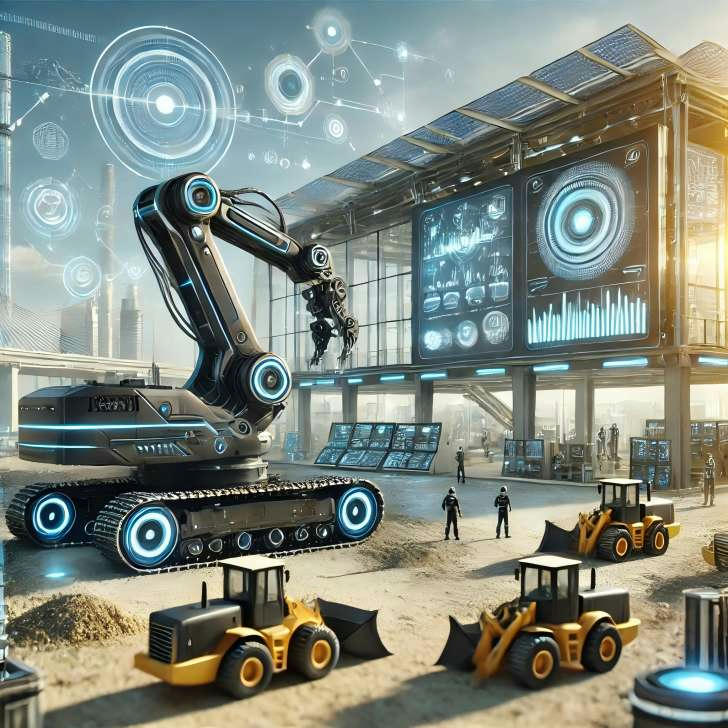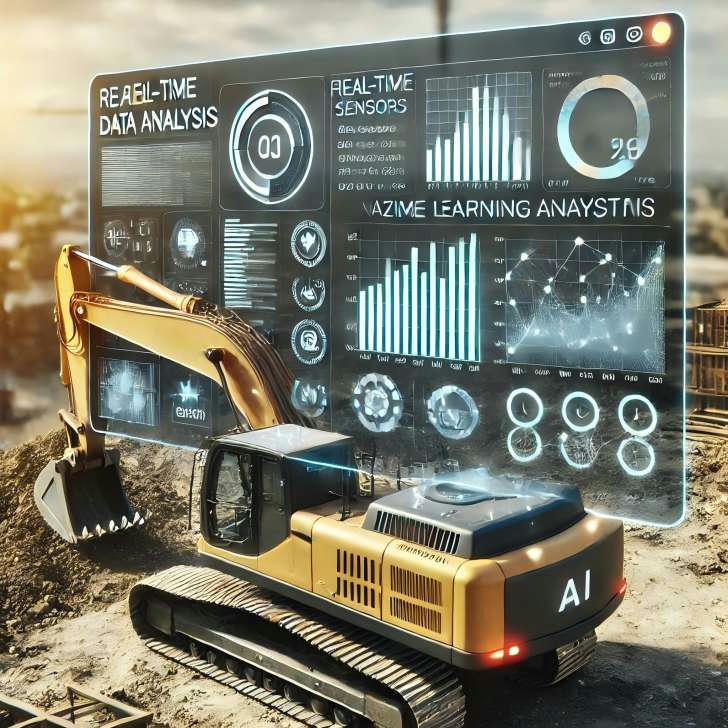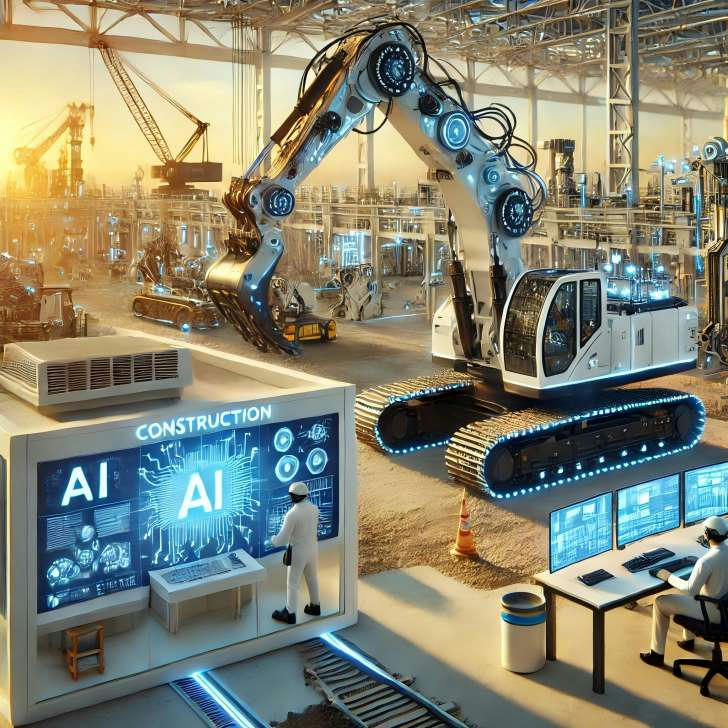Future Excavator Technology: How Automation and Artificial Intelligence are Transforming the Construction Industry
As technology rapidly advances, the construction industry is undergoing a profound transformation, with excavator technology at its core. Automation and Artificial Intelligence (AI) are increasingly integrated into the design and operation of excavators, significantly improving efficiency, safety, and sustainability. Below are some key areas where future excavator technology, driven by automation and AI, is set to revolutionize the construction industry.

1. The Application of Automated Excavators
Automated excavators, capable of performing tasks through pre-programming or remote control, can operate without human intervention. Here are some applications of automation in excavators:
Autonomous Driving and Operator-Free Excavation:
Autonomous driving technology allows excavators to perform tasks like digging, leveling land, and transporting materials independently on construction sites. These unmanned systems not only reduce the need for human labor but also can operate 24/7, significantly improving worksite efficiency.
Precision Excavation Technology:
With the help of GPS, laser scanning, and 3D modeling, excavators can precisely control digging depth and angles, avoiding the errors common in traditional excavation processes. This technology reduces waste and speeds up the completion of complex projects.
Remote Control:
Operators can control excavators from a distance, avoiding direct exposure to hazardous environments. This is particularly useful in high-risk scenarios like disaster relief or mining operations, where automated excavators greatly enhance safety.
2. Artificial Intelligence Boosting Efficiency
AI enables excavators to become more intelligent, allowing them to learn and adapt to different working conditions. Here are some key AI applications:
Real-Time Data Analysis and Decision-Making:
AI-equipped excavators use sensors to gather real-time data and adjust their operations accordingly. For instance, AI can optimize excavation processes based on soil density, material strength, and other factors, ensuring maximum efficiency.

Machine Learning and Predictive Maintenance:
By analyzing historical data, AI can predict potential equipment failures, allowing for preventive maintenance. This predictive capability reduces downtime and operational costs.·
Collaborative Work:
AI can enable multiple excavators and other construction machinery to work together seamlessly, communicating with each other to optimize resource allocation and workflow. This is particularly beneficial for large-scale construction projects, where synchronized operations can significantly improve progress.
3. Enhancing Safety and Reducing Labor Demand
Automated Obstacle Avoidance:
AI-equipped excavators can detect obstacles and people in their surroundings through sensors and cameras, automatically adjusting their path. This greatly reduces the risk of accidents on-site, especially in complex or crowded construction environments.·
Reduced Labor Demand and Costs:
As automated excavators become more widespread, construction companies will rely less on manual labor, thus reducing human resource costs. While this may reduce demand for certain types of workers, it also creates new opportunities for skilled labor in the operation and maintenance of automated machinery.·
4. Environmental Sustainability
Automation and AI not only improve construction efficiency but also contribute to sustainability:
Lower Energy Consumption and Emissions:
Intelligent excavators can choose the most energy-efficient operating mode based on real-time data, reducing fuel consumption and carbon emissions. This not only lowers environmental impact but also cuts operating costs.
Efficient Resource Utilization:
AI systems can precisely control the use of resources, preventing over-excavation or material waste during construction. This precision saves on material costs and reduces damage to natural resources.
Automation and Artificial Intelligence are breathing new life into excavator technology, reshaping the traditional construction industry. These technologies not only boost efficiency and safety but also drive the industry toward greener and more intelligent solutions. As these technologies mature, the construction sites of the future will be smarter, more sustainable, and more efficient, with automated excavators playing a vital role in this transformation.
Impact of Artificial Intelligence on Excavators
1. Precise Data Analysis
Artificial intelligence boasts powerful data processing capabilities, allowing for real-time analysis of multiple variables on construction sites. Through sensors and machine learning algorithms, AI-driven excavators can perceive changes in their surroundings and make intelligent decisions. For instance, based on comprehensive analysis of terrain data and weather conditions, AI-powered excavators can optimize paths and construction plans, boosting work efficiency.
2. Intelligent Maintenance and Fault Prediction
Artificial intelligence can also be used for equipment status monitoring and maintenance. By modeling and analyzing historical data of machines, AI systems can predict equipment failures in excavators and provide warnings before issues occur, significantly reducing downtime. This preventive maintenance ensures continuous and efficient operation of excavators, safeguarding the progress of construction projects.
Challenges Brought by Automation and Artificial Intelligence
1. Technology Integration and Investment Costs
Although the application prospects of automation and artificial intelligence in excavators are vast, the initial investment required for introducing advanced technologies is relatively high. Meanwhile, integrating these technologies requires time to ensure that new systems seamlessly align with existing construction processes and equipment.
2. Training and Management of Personnel
As automation technology becomes widespread, construction companies need to retrain operators to adapt to the new technological environment. This includes training for operating new equipment, mastering software programming skills, and understanding AI systems. Enterprises must effectively manage human resources during the transitional period of change.

Typical Cases and Outlook
In recent years, several internationally renowned construction equipment manufacturers have innovated in this area. For example, Komatsu's "smart construction platform" combines 3D modeling, automation, and AI technology, allowing excavators to efficiently complete earthworks in an unmanned manner.
In the future, we can anticipate a broader application of automation and artificial intelligence technology in the construction industry, especially in large-scale projects. This will not only enhance construction efficiency but also drive the entire industry towards a more intelligent and sustainable direction.
Conclusion
Automation and artificial intelligence technologies are gradually changing the role of excavators, transforming them from simple construction tools into efficient and intelligent construction assistants. This transformation not only improves construction precision and efficiency but also brings about safety and cost benefits. Although this revolution faces technological and managerial challenges, it paints an optimistic and innovative picture for the future of the construction industry. With ongoing technological advancements and industry collaboration, the future of excavators and related technologies is filled with unlimited possibilities.
